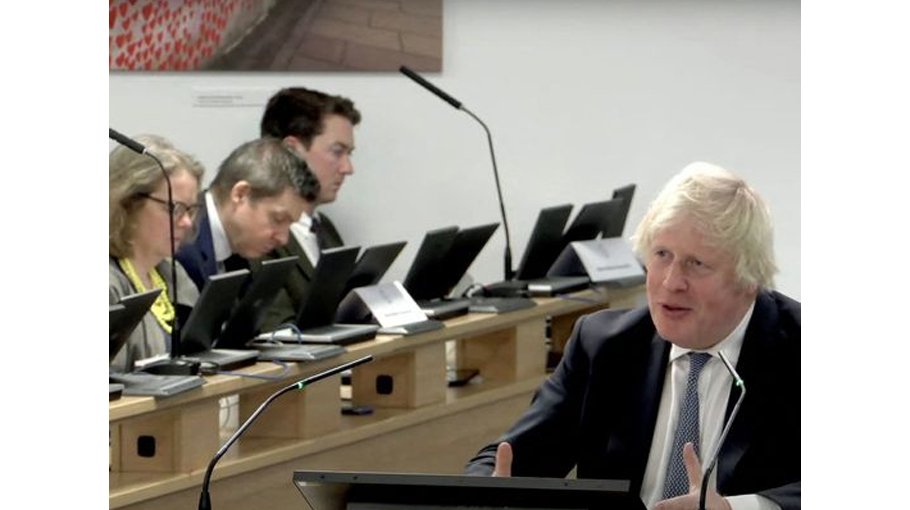From pandemic to policy: Unpacking Boris Johnson’s legacy

A few days ago in London, former UK prime minister Boris Johnson was up dark and early before the crack of dawn. No, it’s not some new fit bit or keep fit regimen. It was simply an exercise in trying to save his skin from even more very public embarrassment.
Boris, you see, was scheduled to begin his long anticipated evidence into the Covid inquiry currently underway in the UK capital, and the early morning rouse was an attempt to avoid the protesters who are determined to hold him and his former Cabinet colleagues to account for their actions during the greatest crisis to strike in peacetime since the Second World War.
Britain, depending on what way you count, had the second-highest death toll per capita from coronavirus in the western world, with some 232,000 Britons succumbing to the disease. Every one of those victims leaves behind family and friends, and many of those bereaved believe Boris is at least partly responsible for those deaths. For those protesters, that press photographers and television cameras knew of his early morning arrival serves to underscore that he remains obsessed with his public persona and is trying to shape his legacy for now and for a future, possible return to politics.
So far, this inquiry has heard in language that would make a sea pirate blush, of the infighting within government, of their failure to follow scientific advice, of their complete lack of understanding of the scale of the crisis facing their nation, and of indifference to the life-and-death consequences of their inactions. Those relatives want to know, for example, why Boris told his inner circle to “let the bodies pile up” and that coronavirus was killing those “whose time was up”. The Johnson administration was slow to lockdown — some two weeks behind Italy, the first European nation to do so, and at least a further week behind the likes of Ireland, the Netherlands and France.
COVID UK
Breeding ground for virus
Johnson believed that the virus would peter out of its own accord, and his government moved elderly and infirm patients, many of who had already contacted the virus or were vulnerable to it, to understaffed nursing homes that were wholly unprepared and never intended to deal with infected and infectable residents living in closed communal environments — the perfect breeding ground for the virus.
And when scientific advice warned of staying apart, keeping a social distance, the Chancellor of the Exchequer at the time, Rishi Sunak, was spending £850 million on his “eat out to help out” scheme that offered discounted meals in restaurants — flying in the face of all the epidemiological evidence. Sunak will be appearing before the inquiry later in December.
Those failures, of course, are in addition to what was going on behind the scenes at Westminster, where Johnson and many others held gatherings while the rest of Britain was under government approved and enforced lockdowns. It was one rule for the PM and his staff, another for Britons who were kept apart and forced to endure the lonely deaths of too many. And even then saying goodbye at funerals was wholly impossible. It will be several years before the official report is published but that number of 232,000 speaks columns already enough for Johnson’s legacy.
Getting Brexit done
That legacy includes getting Brexit done. That it was done with a blatant disregard for growing Bregret that a majority of Britons now feel, but there is little appetite just yet in revisiting the UK’s membership of the European Union. That membership had brought the free movement of people across Europe, the right to work in any EU state. Brexit was supposed to end that.
In Britain right now, there is growing anger at both the number of illegal and legal migrants arriving on its shores. Yes, Sunak’s government has many plans to “stop the boats” and is still determined to send refugees to Rwanda for processing. But legal migration? Despite Brexit and that pledge to take control of the UK’s borders, some 800,000 more foreigners came to the UK to live than those that left.
Many of those work in that care-home sector that was so hard hit by coronavirus. One job in three in the sector is unfilled, pay is low and hours long.
Now, in an attempt to curb those legal migration numbers, the Conservative government wants to place a £40,000 minimum annual salary on jobs for foreign workers. That means those care homes will be hardest hit and make it nigh impossible to hire new staff.
This toxic shift in Conservative thinking is part of Johnson’s legacy too.
Mick O'Reilly is a Foreign Correspondent
Source: Gulf News



